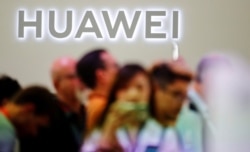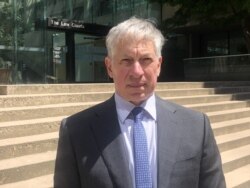In the closely watched extradition proceedings against Huawei Chief Financial Officer Meng Wanzho, a Canadian court found that the fraud the tech executive is accused of by the United States, if proven, would also be criminal in Canada.
In her 23-page decision, British Columbia Supreme Court Associate Chief Justice Heather Holmes found on Wednesday the charge “the making of intentionally false statements” meets the requirements of the crime of fraud. The finding came after a January hearing.
The narrowly focused decision is important because Canada will not extradite an accused person unless the charges are illegal in both countries, a Canadian legal doctrine known as “double criminality.”
The ruling does not determine guilt or innocence. It only concerns whether Meng's actions would be considered a crime under Canadian law. Meng and Huawei have denied the U.S. allegations.
Meng was hoping the charges would not be found illegal in Canada, and she would have been freed from modified house arrest. She is expected to appear in court next month in another move to block extradition.
Her case has put Canada in the middle of the trade struggle between China and the U.S., which is trying to persuade allies to avoid using Huawei equipment in their next-generation mobile telecommunications systems, known as 5G. Washington views the Huawei equipment as a security threat, and many countries are phasing it out, according to the Statistica website.
Canadian authorities, acting upon a request by the U.S., arrested Meng at Vancouver International Airport on December 1, 2018, as she was in transit to Mexico. She has been living under a form of modified house arrest in one of her two mansions in Vancouver, pending court deliberations.
Meng is accused by the U.S. Justice Department of helping Skycom Tech Co. Ltd., an “unofficial” Huawei subsidiary in Iran, attempt to circumvent American sanctions against Iran, while serving as the chief financial officer of Huawei, the Chinese tech giant founded by her father, Ren Zhengfei, in 1987.
The U.S. Justice Department’s indictment also alleges that Meng deceived four banks into making transactions that smoothed the way for Huawei to evade United States sanctions against Iran.
Canadian prosecutors, acting on behalf of the U.S. Justice Department, had alleged that Meng, Huawei and a subsidiary committed fraud and endangered U.S. financial institutions.
During the January hearing, Robert Frater, a lawyer for the attorney general, said, "Lying to a bank in order to get financial services that creates a risk of economic prejudice is fraud." He added that the actions put the bank, HSBC, at risk of U.S. penalties for sanctions violations and reputational damage.
Skycom is alleged to have sold telecommunications equipment to Iran, a sanctions violation.
Canada and Iran
However, Justice Holmes found that allegations brought forth by the U.S. Justice Department that Meng committed fraud by endangering HSBC bank in breaking the sanctions, “do not set out on a causal basis to economic or reputational risk.”
Canada currently has no sanctions against doing business in Iran, and Meng’s lawyers had argued she could not be extradited for violating sanctions.
Holmes also found that the submission by Meng’s legal team on double criminality was too narrow and “would seriously limit Canada’s ability to fulfill its international obligations” in extraditing people for fraud and other economic crimes.
Meng’s next court appearance is set for June.
Richard Kurland, a Vancouver immigration lawyer and policy analyst, has been watching the case closely.
He said there is still an argument that will be made that Meng’s rights were violated at the time of her arrest.
Kurland also said there is a chance for a Canadian political solution, as the justice minister has the ability to cancel any final decision that would extradite Meng to the United States.
"Canada allows a minister to not extradite a person at the last minute, even though there's an extradition order to return the person to the requesting country,” he said. "That means Beijing's not wrong here to put pressure on Canada, economically diplomatically, to motivate Canada to bring extradition to an end.”






